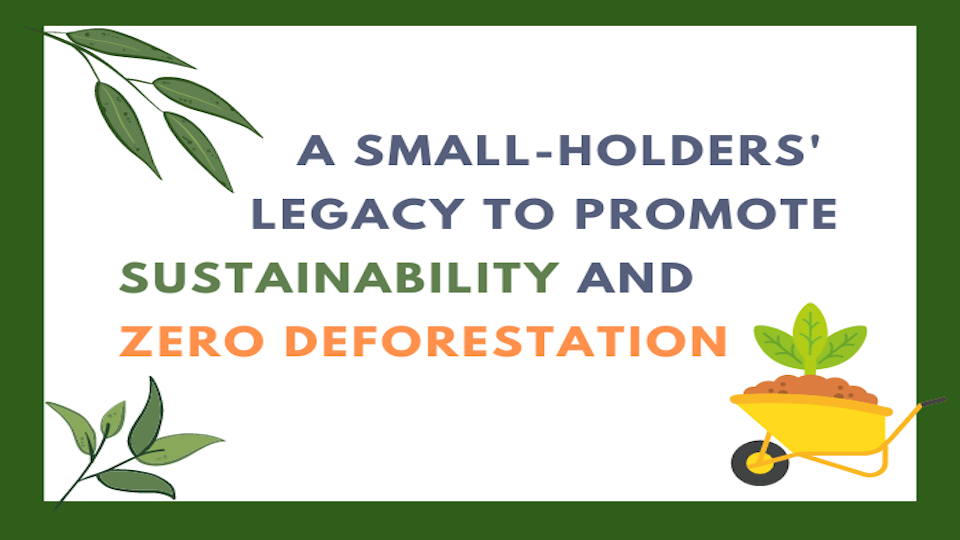Smallholders Legacy – Competere.eu – Pietro Paganini
With Competere we hosted a roundtable with small-holders operating in the oil palm supply chain, the beating heart of global production. Over the course of the conference, several messages emerged:
- Small-holders are crucial for the enhancement of sustainable development and to achieve zero deforestation.
- New EU policies cannot ignore the pivotal role that Smallholders play in food production. Their exclusion would result in more poverty, lower life conditions and individual rights for billion of people globally, with a substantial failure in the attempt to tackle climate change.
- Their inclusion requires proactive policies, stronger investments in nutrient producing countries, an active engagement of EU institutions.
- Green colonialism must be avoided.
Smallholders Legacy
Smallholders Legacy
You can see single clips of all speakers here >>>
- Gert van der Bijl, Senior EU Policy Advisor, Solidaridad
- Djono Albar Burhan, Indonesian Palm Oil Smallholder Association (APKASINDO)
- Adzmi Hassan, National Association of Smallholders Malaysia (NASH)
- Juan Alberto Lemus Silva, Agroindustria Palmera San Román, Guatemala
- Maria Goldameir Mektania, Small-holder
- Daniel Mauricio Rico Valencia, Founder and Director, C-Análisis
- And with the participation of Colombian small-holders Teresa Peña and Nelsy Vega
This is the message launched by smallholders who operate in the oil palm supply chain, the beating heart of global production, that gathered in the vibrant conference “Small-Holders: Drivers of Prosperity and Sustainability“, promoted by Competere – Policies for Sustainable Development, a European think tank committed to promote politics that favour the transition toward resilient and sustainable supply chains.
As stated by Gert van der Bijl, Senior EU Policy Advisor from Solidaridad, “there can be no sustainable production without including smallholders and their socio-economic development, while deforestation cannot be stopped without providing smallholders with the instruments needed to produce sustainably.”
CHECK OUT THE GLOBAL TRADE & POLICY ALLIANCE SUMMIT HERE >>>
All the speakers brought their experience with passion and feeling. Smallholders who, for generations and with their families, have lived the fruits of crops on plantations. Oil palm plantations are a tremendous resource of food for European countries and an opportunity to enhance life conditions for millions of smallholders in South East Asia, Latam, and Africa. In this regard, the speakers have loudly debunked a false myth: the certified sustainable palm oil is not a danger to the environment and human rights, as the basis of the certifications are the criteria of zero deforestation, protection of biodiversity, marginal environmental impact and respect for the rights of workers and local communities.
“The voices of those who work in the sustainable palm oil supply chain lead us to look beyond the reductive and superficial campaigns against it. We are talking about a global production chain that, with transparency and innovation, has long been committed to promoting sustainable projects. Thanks to the efforts of smallholders in delivering the transition, the rate of deforestation associated with palm oil has dropped dramatically since the early years of the decade, despite a 30% increase in world production during the same period. This is the only way to provide concrete results, protecting first of all development and people’s freedom”– says Pietro Paganini, President of Competere.
WATCH IT AGAIN: IPEC 2021 THE MARKETING TRICK >>>
Oil palm cultivations have a much lower environmental impact and soil consumption than other vegetable oils. The same extension makes up to ten times the product compared to other oil plantations: although palm oil is the most widely used in the world representing 35% of global production, with a gap of seven percentage points from soybean oil, its production requires only 10% of total oil crops.
In addition, it is a valuable ally for social sustainability. In fact, sustainable certifications lead to important improvements in terms of respect for human rights: a path that is leading to a real social transformation in the societies involved.
Daniel Mauricio Rico Valencia, Founder and Director, C-Análisis, described the positive effects of oil palm plantations on a municipality regarding education – a 2.7% increase in primary education and a 2% increase in high school education – and health – a 1% plantation expansion corresponds to a 2% increase in the number of families covered by health insurance, while there would be a 9.7% increase in local investments and better legal and labour conditions.
WATCH IT AGAIN: MISLEADING LABELS – WEBINAR ORGANISED BY CPOPC >>>
The positive effects on the local economy are also considerable, guaranteeing a means of development for communities. On the contrary, a blanket ban on palm oil risks penalizing the actors that produce in a sustainable way, discouraging them from producing in a sustainable way.
Thus, for the smallholders Nelsy Vega and Teresa Pena, palm oil production means life, hope and development opportunities, both for them and their children, calling the EU not to discourage sustainable production as the ones they are developing.
Djono Albar Burhan from the Indonesian Palm Oil Smallholder Association (APKASINDO), suggested that “smallholders reap social and economic benefits from palm oil plantations, which supports the development of entire communities, even if longer supply chains are cutting revenues for farmers.”
WATCH IT AGAIN: SUSTAINABLE PALM OIL FOSTERS BIODIVERSITY >>>
Obviously, an effective transition to sustainable production brings on challenges, with training being a key. Maria Goldameir Mektania, smallholder, stressed that ”farmers need proper training to carry out the transition to ecologically sustainable methods of production. And that if policies and prices of commodities keep changing, smallholders will be the most negatively affected players.”
And Adzmi Hassan, from National Association of Smallholders Malaysia (NASH) stated that the main challenge in adopting sustainable standards comes from earning incentives.
juan Alberto Lemus Silva, Agroindustria Palmera San Román, Guatemala, focused on EU policies. He stated that they “could hamper, rather than incentivize, production in Guatemala by increasing prices and complicating export rules and regulations.”






